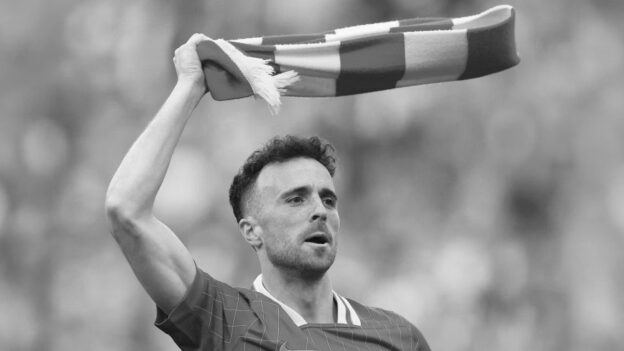It has been suggested that social practices surrounding death throw into “relief the most important cultural values by which people live their lives and evaluate their experiences” (Huntingdon and Metcalf 1979: 25). The recent untimely death of the Liverpool FC striker Diogo Jota and his brother André Silva in a car crash – just a few weeks since winning the Premiership title and his wedding to his longtime partner Rute Cardoso with whom he had three children – has led to an immense outpouring of public grief. Make-shift shrines have appeared at Anfield, the home of Liverpool FC, and at Jota’s hometown of Gondomar in Portugal. There have been moving tributes paid on social media by his friends and teammates. The tragedy is at the top of the news cycle. In this short post I offer some reflections on why Jota’s tragic and untimely death has generated such an outpouring of public grief.
At one level, there is something about Jota’s death that transcends the moment: a young man who seemingly had everything at his feet – a beautiful family and a successful career – and yet it can all be gone in an instant, leaving a huge hole in the lives of those closest. Where is the meaning? How can it possibly be right or make sense? The possibility that there might be no meaning, and any meaning is probably better than none at all, is a potent religious and philosophical question, one that was notably explored by Nietzsche in On the Genealogy of Morals (1996).
But I wonder if Freud and his theory of displacement is a more useful partner in trying to think through what is going on in these spontaneous performances of emotion and mourning. 2025 has been a year of wars in Gaza, Iran, Myanmar, Sudan and Ukraine in which hundreds of thousands have been killed. These deaths – overwhelming in their number and layered in complex affective politics – do not and have not generated the same kinds of spontaneous grieving that we are witnessing in relation to Jota and his brother. My suggestion is that Jota’s violent death has enabled the displacement of emotion away from the inconsolable and ungraspable losses of war and onto something no less tragic but nevertheless more manageable. As a Liverpool fan reflecting on my grief for Jota, his brother and his family, I cannot but question the role of the media in helping to channel the energy of grief (and anger) to a footballer at the expense of the civilians under fire around the world. Jota’s death is awful and makes no sense. But there are reasons people are being killed in Gaza, Iran, Myanmar, Sudan and Ukraine, and those reasons need confronting.
References
Huntingdon, R. and Metcalf, P. (1979), Celebrations of Death: The Anthropology of Mortuary Ritual, Cambridge: Cambridge University Press.
Nietzsche, F. (1996), On the Genealogy of Morals, (trans), D. Smith, Oxford: Oxford University Press.

